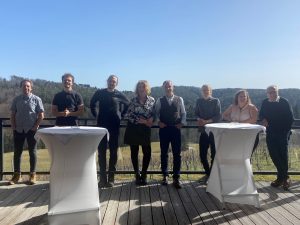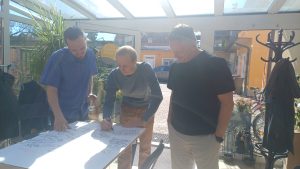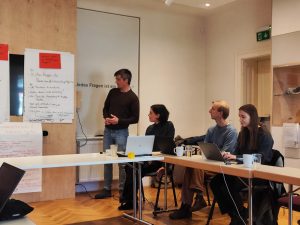The 2-lane Gleisdorf one-way ring road no longer met current road safety standards. Unsecured safety lanes across two lanes of the one-way road, tight bend radii for heavy goods vehicles and buses and other deficiencies were identified. The province of Styria, as the road owner and authority for the provincial road, developed a comprehensive , future-oriented mobility concept together with the municipality of Gleisdorf and specialist planners.
The aim was to improve the infrastructure and optimize safety and traffic flow for all users – pedestrians, cyclists, motorists and public transport.
The first section of the “Grazer Straße – Neugasse” one-way ring road was implemented in 2022. The carriageway was reduced to one lane for motor vehicle traffic and the remaining space was used to expand the cycling infrastructure.
In the following years, section 2 “Schillerstraße” and section 3 “Ludwig-Binder-Straße” were implemented. At the same time as the construction work, cable carriers were renewed and district heating pipes and fiber optic cables were laid.
PLANUM is supporting the entire project with traffic surveys, concepts for measures, planning of necessary traffic light signal systems, traffic flow simulations, performance analyses of the overall system and evaluation of sections that have already been implemented. These measures will make Gleisdorf’s one-way ring road fit for the future – for safe and sustainable mobility in the city.
Preparations and planning for the final section “Florianiplatz – Franz-Bloder-Gasse” have been underway since 2024. At the citizens’ participation evening (14.02.2025), comments, suggestions and wishes from the residents of Gleisdorf were collected, considered and discussed, and the plans were presented by Atelier für Architektur.
Excellent:
The “Gleisdorfer Ring lifeline” was awarded the European Climate Protection Award by Climate Alliance in 2025. Every two years, innovative municipal climate protection projects throughout Europe are selected and the commitment and successes of European cities are honored with the Climate Star. This brings the best climate protection projects from the Climate Alliance network of over 2,000 members in 27 European countries to the fore.
Further reports in the media:
Queries:
DI Konstantin Mizera, mizera@planum.eu



